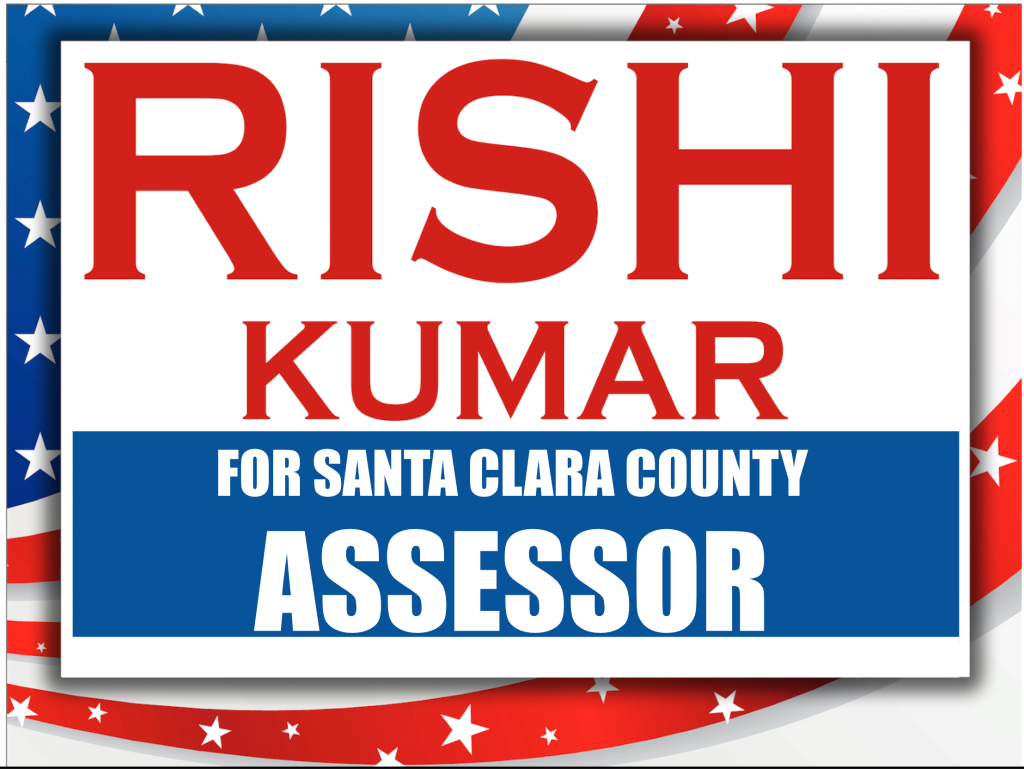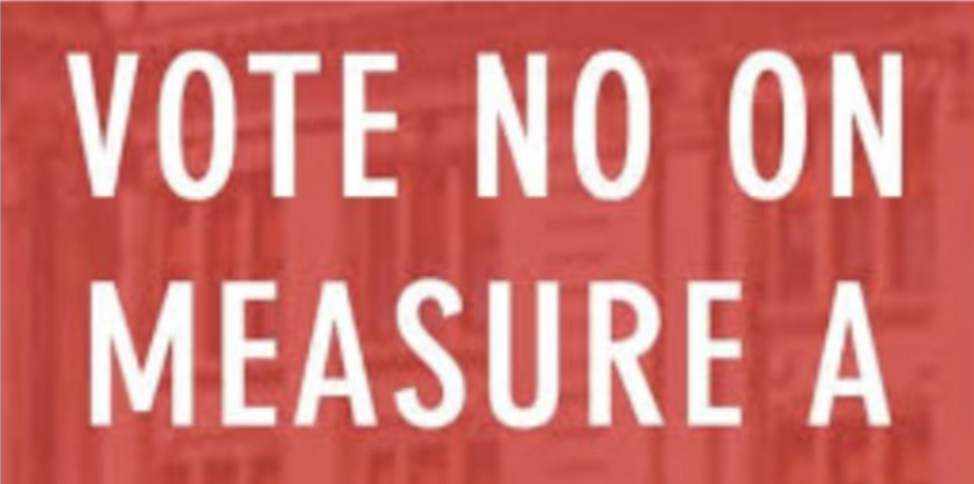
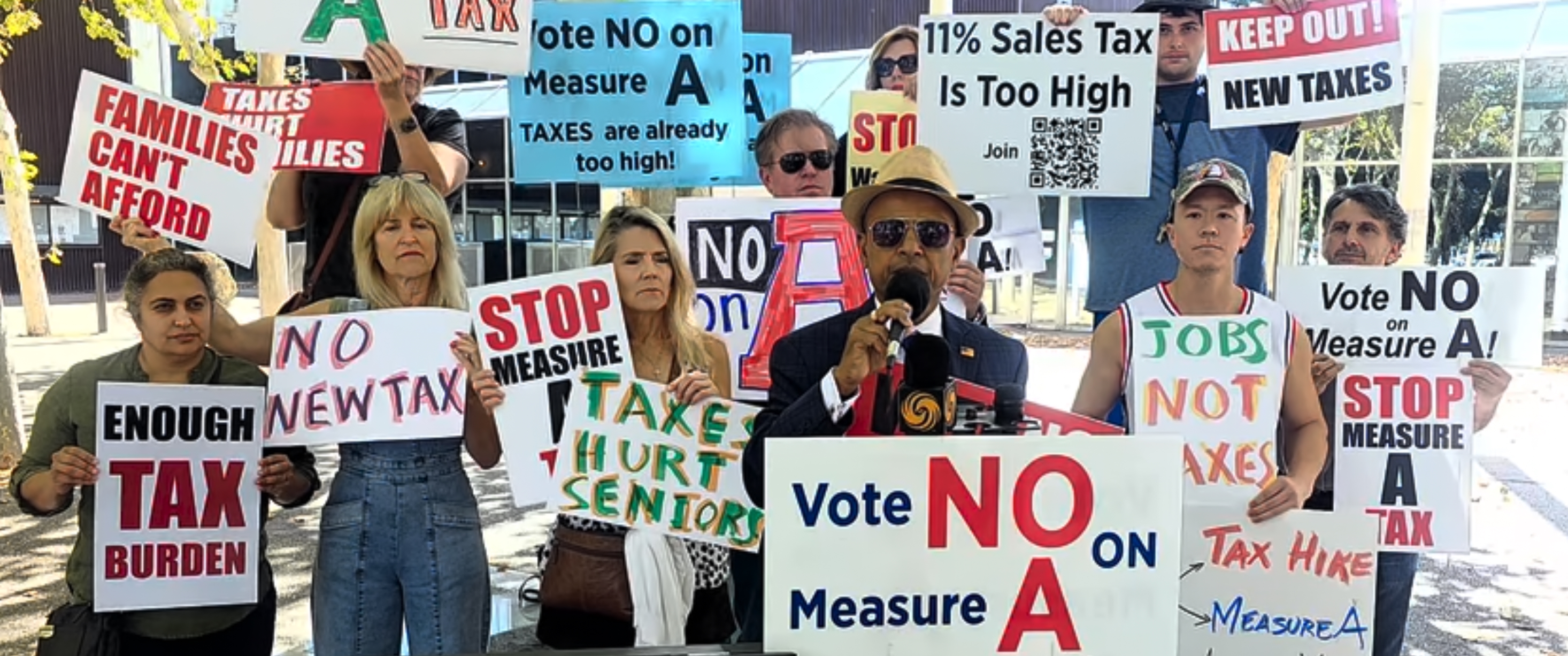
Vote No on Measure A: Reject the sales tax increase
Vote No on Measure A: An Expensive Band-Aid for County Mismanagement
This November, Santa Clara County will vote on Measure A—a countywide measure that would add 0.625% to the county sales tax starting April 2026, raising the base rate from 9.125% countywide, with higher rates in cities like San José and Milpitas (currently at 9.375%) and Campbell (currently at 9.875%).
Times are tough: Living expenses are already high and Measure A would dig even deeper into residents’ pockets while failing to fix the county’s ballooning deficit. The Medi-Cal (Medicaid) cuts by the federal government are devastating, but a highly regressive sales tax impacts struggling families the most.
Rushed and Opaque: The Board of Supervisors pushed Measure A onto the ballot with just 24 hours’ notice—one day before the deadline—without input from local cities or public debate. This tax increase deserved transparency, not an eleventh-hour maneuver bypassing all public input.
Soaring Deficits—No Audits, No Reform, Just More Taxes: In 2019, the County acquired three bankrupt private hospitals—O’Connor, Saint Louise, and De Paul. Instead of stabilizing the system, these acquisitions saddled taxpayers with massive costs. Roughly 52% of Santa Clara County’s net expenditures—about $7.1 billion out of $13.7 billion—go to its Health and Hospital System. By comparison, Los Angeles County spends $14 billion out of a $46.8 billion budget on health services, even though its population is five times larger than Santa Clara County’s.
Santa Clara County’s losses were $600 million last year, projected at $1 billion this year, and up to $3 billion annually by 2030. Measure A would raise about $330 million a year—a fraction of the shortfall. Where’s the plan for the rest? More tax increases? Rather than pursuing structural reform or a forensic audit, county leaders have pushed this tax hike—a band-aid that fails to heal the huge wound.
General Tax, No Guarantees: The County markets Measure A as a healthcare fix, but it’s a general tax requiring only fifty percent approval not a special tax needing two-thirds approval. By pushing a simple-majority general tax, no funds are legally required by the county to go to county healthcare—it’s a blank check with no guarantees.
Tax Hikes Instead of Accountability: “Temporary” taxes in Santa Clara County have a habit of becoming permanent. Meanwhile, the Valley Transportation Authority already collects revenue from three separate sales taxes, yet still recovers only 7–10% of its costs through fares, a failure highlighted in a Grand Jury Report.
Raising taxes is “easy”: Rather than fixing waste and inefficiency, county leaders keep coming back to taxpayers for more—most recently by opting into SB 63, a regional 0.5% sales tax headed for the November 2026 ballot to fund Bay Area transit agencies. And now you see why Measure A has been rushed into a special election: to keep it separate from the transportation tax hike and slip it through with as little scrutiny as possible.
Enough is enough: No more bailouts for County mismanagement. No more tax increases. On November 4, Vote No on Measure A.
Rishi Kumar, Chair, No On Measure A Tax SCC2025 and Councilmember, Saratoga (fmr), 📞 Phone: (408) 805-5993 Kansen Chu, Assemblymember (former) Lian Fang Chao, Mayor, Cupertino Liz Lawler, Mayor, Monte Sereno (fmr) Lydia Kou, Mayor, Palo Alto (fmr) Rowena Turner, Mayor, Monte Sereno (fmr) Media Contact: Email: noonmeasureatax@gmail.com
Press Coverage of the No on Measure A Viewpoint
https://www.kqed.org/news/12060326/measure-a-opponents-criticize-county-mailer-ahead-of-election
https://www.mercurynews.com/2025/09/25/santa-clara-county-poll-shows-support-among-likely-voters-for-measure-a/
San Jose Spotlight
https://sanjosespotlight.com/lawsuit-challenges-santa-clara-county-sales-tax-measure/
https://www.svvoice.com/no-on-
https://www.losaltosonline.com/news/santa-clara-county-to-vote-on-measure-a-sales-tax/article_4a9f43b1-6a1b-4793-9361-0c9b2055e76f.html
https://losgatan.com/vote-no-on-measure-a-its-time-to-tighten-our-belt/
https://santaclaranews.org/2025/09/30/ballot-argument-against-measure-a-novembers-sales-tax-increase/
CA Political News
https://capoliticalnewsandviews.com/not-an-emergency-rishi-kumar-says-measure-a-just-the-first-in-a-wave-of-tax-proposals/
Opportunity Now SV
https://www.opportunitynowsv.org/blog/-santa-clara-wants-a-56-cent-sales-tax-will-that-cover-public-health-losses-of-3-billion-per-year
Epoch Times (Chinese press):
https://sf.epochtimes.com/
Sing Tao USA
https://www.singtaousa.com/5337001
Here’s the video
https://youtu.be/VytlWQz–ts
In this eye-opening video, Rishi reveals the truth about the county’s covert taxpayer-funded campaign promoting Measure A, shares his vision as the next County Assessor, and exposes the three biggest lies in this race.
Watch now to learn why Rishi’s fight for transparency, accountability, and taxpayer fairness is the most important story in Santa Clara County today — and why your vote matters more than ever. As Rishi explains, you don’t need an assessor realtor with a piece of paper, you need a reformist!
Double Taxation for El Camino Healthcare District residents
El Camino Healthcare District Residents Face Double Taxation Under Measure A
Voters in Los Altos, Los Altos Hills, Sunnyvale, and Mountain View, along with smaller sections of Cupertino, Santa Clara, and Palo Alto, already fund healthcare services through property tax payments made to the El Camino Healthcare District.
Why should residents be forced to fund the county healthcare system when they already pay property taxes to support El Camino Healthcare — a system they are unlikely to use? Every dollar diverted to healthcare means less funding for these communities local schools and cities. Why demand even more for a parallel system they won’t benefit from? Why are residents of these cities being asked to fund a county healthcare?
How many times should families be forced to pay for healthcare? Once through their private or corporate coverage, again through El Camino Healthcare taxes, and now Measure A’s new sales tax for the county system. Enough is enough.
That’s fundamentally unfair and meets the definition of double taxation.
For many seniors and working families, it’s inflation, of living and housing costs, from which it seems there is a little hope of escape.
On November 4, we urge voters to say NO to Measure A and reject this double taxation.
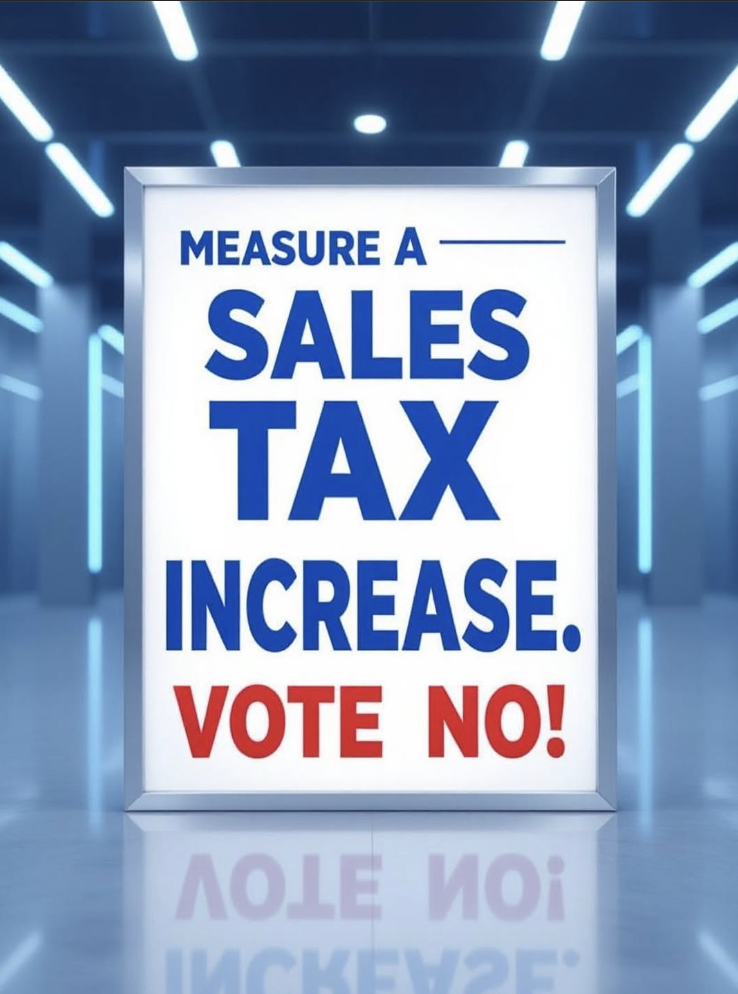
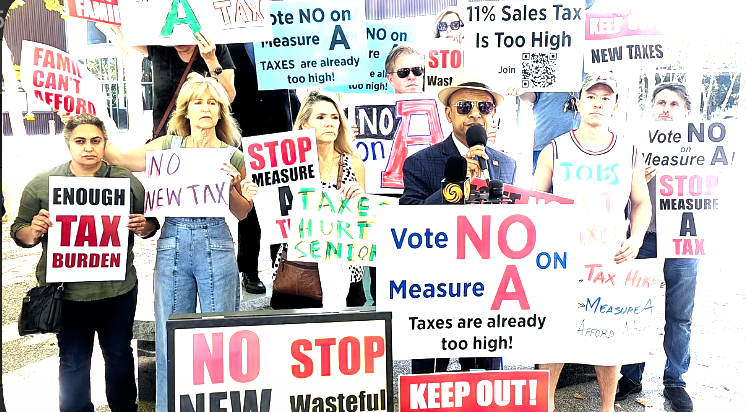
Mercury News Coverage of the No on Measure A Meet the Press
Rishi Kumar, a candidate for Santa Clara County assessor, speaks to the media during a No on Measure A press conference in front of the Santa Clara County Government Center in San Jose, Calif., on Monday, Sept. 22, 2025. (Grace Hase/Bay Area News Group)
Opponents of Measure A say taxes are already too high in Santa Clara County Santa Clara County voters will decide whether to approve a sales tax increase in November
Grace Hase covers Santa Clara, Sunnyvale and Cupertino for The Mercury News.
By Grace Hase | ghase@bayareanewsgroup.com | Bay Area News Group
UPDATED: September 22, 2025 at 4:09 PM PDT
Chanting “no new taxes” in front of the Santa Clara County Government Center on Monday, a small coalition of residents spoke out against Measure A — a proposed five-eighths-of-a-cent sales tax increase to counteract the estimated billion dollars annually in lost federal revenue to the county.
Santa Clara County voters will decide on Nov. 4 whether to approve the general sales tax, which county officials say is critical to preserving access to health care and other services that largely rely on revenues from Medicaid. In July, Republicans in Congress cut one trillion dollars from the federally funded health insurance program over the next decade via the “Big, Beautiful Bill.” One in four residents in the county rely on Medicaid, known as Medi-Cal in California.
But the coalition, which is led by former Saratoga Councilmember Rishi Kumar, argues that taxes already are too high and that an increase to the sales tax rate would hurt seniors and families. The local sales tax rate is currently 9.125% countywide, and the 0.625% increase would put Campbell, Milpitas and San Jose at a 10% sales tax rate or higher. County officials, though, say the sales tax would sunset after five years.
Kumar, who is also running for county assessor this November, criticized the county for buying “private hospitals that were bleeding red” in recent years.
“We are no longer a county operation, we are a healthcare operation that is actually running a county,” Kumar said. “That’s not justified at all.”
Santa Clara County has the second-largest county-owned health care system in the state, operating four hospitals and 15 clinics. The county most recently purchased Regional Medical Center in East San Jose after its former owner, HCA Healthcare, announced it would close the hospital’s trauma center — a move that would have left much of the East Side without access to lifesaving care.
County Executive James Williams said in a statement that Santa Clara Valley Healthcare operates two of three trauma centers in the county and handles 80% of all trauma cases.
“Our hospital and health care system is under direct threat because of the federal government’s actions to cut funding for public hospitals and strip access to care for thousands of patients” he said. “County governments are charged with taking care of people, and our residents rely on the county’s system of emergency and specialized care, which saves lives and keeps our community healthy and safe.”
Instead of raising taxes, Kumar is calling on the county to audit its spending.
“We need to apply some of the corporate efficiency to Santa Clara County,” he said.
Dan Stegnik, the secretary for the No on Measure A campaign, said the proposed tax increase comes at a time when families are forced to choose between buying groceries or filling their car with gas.
He also is worried about how the money from the tax hike — estimated to be $330 million annually — will be spent. The Santa Clara County Board of Supervisors is expected to approve a spending plan for the revenue at a later date, though a large chunk is expected to go toward health care-related expenses.
“It’s a general tax, not a dedicated tax,” Stegnik said. “The money isn’t allocated to anything and can be used for any purpose including building buildings and even buying cars.”
Several current and former elected officials who were not in attendance at Monday’s press conference also signed onto the coalition to oppose the measure, including Cupertino Mayor Liang Chao, former Assemblymember Kansen Chu, former Palo Alto Mayor Lydia Kou, and former Monte Sereno mayors Liz Lawler and Rowena Turner.
Chao in a statement said that almost every current and former mayor in the county that she’s spoken with agrees that sales tax revenues are not the right way to fund local hospitals. The increase, she said, is also unfair to some communities — like those living in the El Camino Healthcare District — whose property taxes go in part to support the hospital.
“In just a decade, the county’s health spending has more than doubled, from $2.2 billion to over $6.1 billion,” she said. “By contrast, Los Angeles County — with five times the population — spends about $14 billion, far less per person. Until Santa Clara County provides a credible, sustainable plan, it is not right to ask residents to throw more money into a broken system.”






